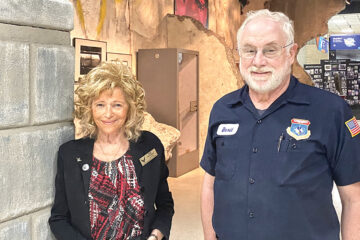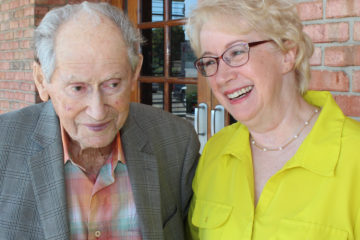70 years after liberation

By Sam Heider
I was born in Poland in a small village by the name of Biejkow, the son of Jewish farmers. We were six children: three brothers, three sisters, my mother and my father. When Germany occupied Poland, we were forced to leave and go to a ghetto in a little town by the name of Bialobrzegi.
In August 1942, I was taken away from my family. I was sent to a concentration camp in Radom, Poland, to an ammunition factory. We made guns for the Germans so they could kill Jews. I remained in Radom until 1944.
Many of us died on a death march there for more than a week. Those who lived were put in cattle cars, 60 people to a car, with no food, no water, no sanitary facilities. The smell of human waste was unbearable.
When we arrived in Auschwitz we couldn’t believe our own eyes: we were greeted with a beautiful orchestra and a big sign, Arbeit Macht Frei, which means Work Makes You Free.
The same day, we went through a selection, facing the “Angel of Death,” Dr. Josef Mengele, waiting for him to decide whether I should live or be put in the gas chambers.
I kept pinching my cheeks to make myself look healthy. He finally came to my row and looked at me with his sadistic smiling face, straight in my eyes. My arms were up half way. Had he ordered me to raise my arms up a little higher, I would have had to drop the only picture of my sister, which I managed to save all those years under my arm — going through several selections, including Auschwitz — and even going into showers, going in one door and coming out the other.
I managed to save this picture to this day.
Mengele motioned me to the right. Had he motioned me to the left, I wouldn’t be here today.
Next to my row were twin brothers. Mengele looked at them for a while and said, “You are twins, yes?” He then ordered them taken away. As we found out later, Mengele made all kinds of medical experiments with twins.
After the selection in Auschwitz, I was sent to three more concentration camps including Dachau. In Dachau, we didn’t work. We were just waiting to be put in the crematoriums.
In Dachau, we lived under the most inhumane conditions mankind has ever known, living on a piece of bread and a little bit of watery soup. When I went to get the soup, I had to climb over piles of dead bodies. And I didn’t know if the smell was from the soup or from the dead bodies. Therefore, many times I didn’t go for the soup. I didn’t care if I lived or died. Life was meaningless, with no hope of survival.
After a short time in Dachau, on April 23, 1945, we were put on a train in cattle cars, 60 people to a car, again with no food, water, or sanitary facilities. Many of us died on the train. With no place to go, the train went back and forth.
On April 28, it stopped at a place called Staltach. We were ordered out and told not to move. After a while, we saw a lot of tanks on the nearby highway. A few turned in our direction. The closer they came, one of us starting yelling in Yiddish, “Amerikanes, Amerikanes.” The most beautiful sound I ever heard.
One soldier came from behind one of the tanks and as he approached us, with a little machine gun, he said in broken German, “Du hab kein angs, du bist frai.” Don’t be afraid, you are free. It was April 30, 1945. Those words will remain with me for the rest of my life.
Two days before the liberation, we had received packages of food from the Red Cross. Many of us died after eating everything. We were lucky that the Americans took away the packages.
I was sent to a displaced persons’ camp in Landsberg Am Lech, Germany.
In the Feb. 8, 2015 issue of The New York Times, I read a news analysis by Eric Lichtblau: Surviving the Nazis, only to be jailed by America. Lichtblau is a Washington, D.C. correspondent for The New York Times and wrote the book The Nazis Next Door: How America Became a Safe Haven for Hitler’s Men. Lichtblau writes in the article that “even after the victorious American and Allied forces took control over the camps, the survivors…remained for months behind barbed wire and under armed guard.” He also writes that “many Jews were left wearing the same notorious striped pajamas that the Nazis first gave them.”

This was not what I saw at Bergen-Belsen or at my DP camp at Landsberg.
I went to Bergen-Belsen right after the liberation. I didn’t find any of the survivors wearing the same uniforms as in concentration camps, or behind barbed wire, or under armed guards.
We wore nice tailor-made suits, and handmade boots. We had tailors and shoemakers. In Landsberg and the other DP camps I saw, ladies wore beautiful dresses.
We also had a kosher butcher store and little grocery stores. I myself had a little grocery store. I made ice cream, which I sold at football games.
I even met my wife in 1945 at the Bergen-Belsen DP Camp and I took her with me to Landsberg, where we lived after the liberation until 1949 when we were sent to the United States. In Landsberg, we were married in 1946. Our son, Morris, was born in there in 1947.
I am outraged by what Lichtblau writes. In his article, Lichtblau uses the general terms “many Jews” and “thousands of survivors” but he doesn’t mention where it took place and doesn’t give any documentation.
In Landsberg we had everything we could ask for. We had plenty to eat, we could go any place we wished, we never had barbed wire. We had a beautiful dining room with the best food. Whoever wanted to cook his or her own food was given plenty of food to cook. I also visited several other DP camps in which I had relatives. I never saw barbed wire. We never had armed guards watching us.
How did I survive the Holocaust? And why am I the only survivor of my family? I don’t know the answer. Perhaps God knows the answer, or there is no answer. The images of piles of dead bodies will remain with me for the rest of my life.
What outrages me the most is that the world kept silent. No one intervened on behalf of the Jews. Knowing that Hitler was planning for the Final Solution of the Jewish people, no one spoke out against Hitler and the Nazis. It should be a lesson learned and never to be forgotten. Never again.
Sam Heider lives in Dayton.
To read the complete April 2015 Dayton Jewish Observer, click here.





